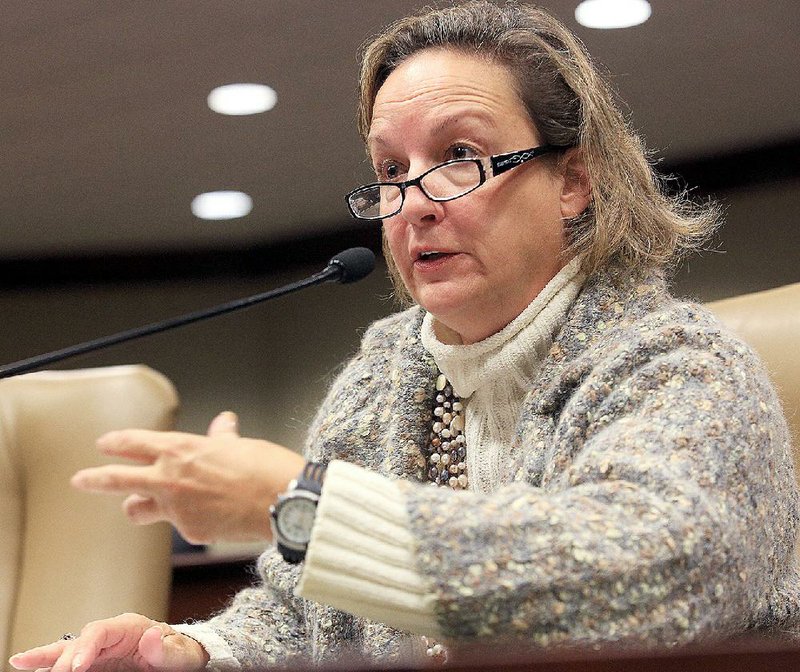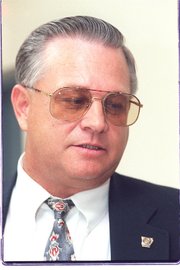For months, the vice chairman of a state board has participated in issuing decisions and setting policy for an agency in which her husband is a key employee -- a situation that the state personnel administrator said Wednesday is "unusual."
Arkansas Board of Corrections Vice Chairman Mary Parker -- who has served since 1993 on the seven-member, governor-appointed commission -- married Dale Reed in October. Reed has been working for the prison system since two days after he graduated from high school about 42 years ago.
At the time they married, Reed was the superintendent of the Ouachita River Correctional Unit in Malvern. Two months afterward, he was appointed by Department of Correction Director Wendy Kelley to chief deputy director.
Reed's salary increased from $94,206.74 as a warden to $103,627.41 in his new position. As a board member, Parker is given an $85-per-meeting stipend and expense reimbursement.
Reed is supervised directly by Kelley and answers only to her. As chief deputy director, however, Reed goes before the Board of Corrections at each meeting to conduct prison business, which includes work such as presenting policies, providing updates and gaining approval for purchases.
Parker said Wednesday that she stepped down in January as board liaison to the Correction Department and told board Chairman Benny Magness that she would abstain from any vote that directly affects Reed.
"We are two people who love each other very much," Parker said. "We were blessed to find each other, and we both contributed a tremendous amount to the state of Arkansas long before we were married. I am just really appalled that anybody would think there is anything unethical in what has been a wonderful addition to my life."
As chief deputy director, Reed is required to live on prison property in Pine Bluff. As Reed's spouse, Parker can live in the 2,650-square-foot home provided by the state.
Correction Department spokesman Cathy Frye said Reed was unavailable for comment Wednesday.
Various state laws and policies apply to married state employees, including Arkansas Code Annotated 25-16-1001 through 1007 and Office of Personnel Management Policy 30.15 and Policy 30.16. Under both the state law and personnel policies, employees must submit a marriage disclosure form to determine whether a conflict of interest exists when one state employee marries another in the same agency.
The Arkansas Democrat-Gazette requested a marriage disclosure document Monday for Parker and Reed. Frye said in a Tuesday email that the department's human-resources administrator contacted the state Department of Finance and Administration after receiving the request, and at its suggestion, "Chief Deputy Director Reed and Dr. Parker signed the form and submitted it today."
"Given that Chief Deputy Director Dale Reed and Dr. Mary Parker-Reed do not work together at the same state agency, neither was ever asked by human resources staff to fill out a marriage-disclosure form," Frye wrote.
Correction Department Chief Legal Counsel Jim DePriest said in an email Wednesday that Parker is not an employee of the Board of Corrections, and therefore state law on married employees does not apply in this case.
"The 'married state agency employees section' applies only to situations where both persons are employees of the same agency. Dr. Parker is not an employee of the BOC [Board of Corrections]. Even if she were deemed an employee of the BOC, the BOC and the ADC [Arkansas Department of Correction] are not the same agency," DePriest said.
DePriest also noted that Arkansas Code 25-16-1007 states that the law "shall not apply to the hiring, transfer, or promotion of any person employed in a state agency as of August 12, 2005."
Because Reed was employed before then, "Clearly, Mr. Reed fits that description," DePriest said.
However, Office of Personnel Management Policy 30.15 states that the law applies to marriages that began after Aug. 12, 2005. Reed and Parker were married Oct. 5, 2014.
State Personnel Administrator Kay Barnhill Terry said Wednesday that the situation "is very gray."
"It is an unusual situation that has not been posed to us previously," Terry said. "We are currently researching the issue."
Judd Deere, a spokesman for Attorney General Leslie Rutledge, said Wednesday that Rutledge's office is researching the matter as well but does not "have enough information to offer a comment."
Parker is a professor at the University of Arkansas at Little Rock, and "she also serves on the Board of Corrections. The Board of Corrections, however, is not a state agency. Rather, it is a panel of volunteers appointed by the governor," Frye said.
Arkansas Code Annotated 25-16-1001 Definitions (4) (A) says the term "state agency" includes, "All boards, commissions, departments, agencies, institutions, state-supported institutions of higher learning, and offices of constitutional officers of the State of Arkansas."
A violation of state nepotism law is a Class A misdemeanor.
State Treasurer Dennis Milligan paid a $1,000 civil penalty in March for violating state law by hiring his first cousin for a job paying $63,000 a year in the treasurer's office. Milligan also voluntarily reimbursed the state for Sam Swayze's gross salary of $6,941.62 for the period the relative worked for the treasurer's office.
Kelley was the sole decision-maker in Reed's promotion and said Wednesday that Reed was the best person for the chief deputy director spot.
"He is the longest-serving warden that we had. Additionally, he is very highly respected throughout the department," Kelley said. "I trust him implicitly. He gets things done. If you say you need it, it happens. I did not grow up in an institution, and I needed someone as a chief who had that experience. He fit the bill. He was my first choice, and I was thrilled when he finally agreed."
The board's role is to set policy for the Correction Department, the Department of Community Correction and the Arkansas Correctional School. The board also hires and periodically evaluates the directors of the three agencies. The hiring and evaluation of the agencies' other staff members is done by the directors with no board input.
Kelley said the fact that Reed was married to one of her bosses did not factor into her decision.
"It might have made me hesitate to offer it to him, but it certainly did not make it more likely for me to give him the position," Kelley said.
Kelley, who was the chief deputy director of the Correction Department until becoming director in January, said Reed had called her directly when he decided to ask Parker for a date at the end of January 2014.
"He wanted to pursue that relationship and said he would resign if it was a conflict," Kelley said. "We discussed the guidelines very clearly. There has never been an issue."
"In terms of their relationship, it doesn't impact the department. They are both invaluable in my point of view. I certainly wasn't going to pass on appointing Dale when he was the best choice for the agency."
Parker said she and Reed set ground rules from the beginning about keeping their official roles completely separate.
"We have done everything that we can possibly do to make sure there is no hint of impropriety or unethical behavior. We want to continue to do what we do very well, and that's serve the citizens of Arkansas," Parker said.
"I love my husband. I wouldn't change a thing. I would marry him again tomorrow. He is the strongest chief deputy director Wendy Kelley could have picked. I applaud her decision to do that as a board member, not as his wife. She's putting a strong management team that will make ADC go leaps and bounds into the future."
State Desk on 04/23/2015

